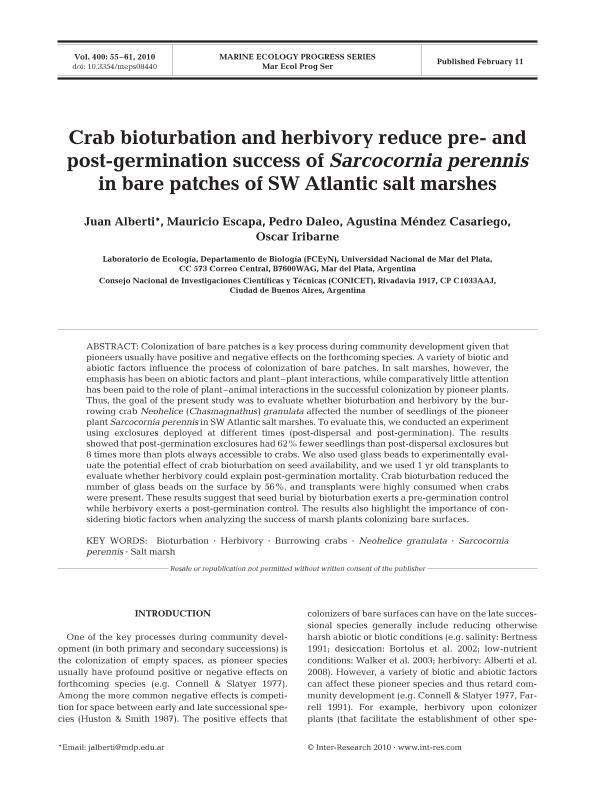Artículo
Crab bioturbation and herbivory reduce pre- and post-germination success of Sarcocornia perennis in bare patches of SW Atlantic salt marshes
Alberti, Juan ; Escapa, Carlos Mauricio
; Escapa, Carlos Mauricio ; Daleo, Pedro
; Daleo, Pedro ; Mendez Casariego, Maria Agustina
; Mendez Casariego, Maria Agustina ; Iribarne, Oscar Osvaldo
; Iribarne, Oscar Osvaldo
 ; Escapa, Carlos Mauricio
; Escapa, Carlos Mauricio ; Daleo, Pedro
; Daleo, Pedro ; Mendez Casariego, Maria Agustina
; Mendez Casariego, Maria Agustina ; Iribarne, Oscar Osvaldo
; Iribarne, Oscar Osvaldo
Fecha de publicación:
01/2010
Editorial:
Inter-Research
Revista:
Marine Ecology Progress Series
ISSN:
0171-8630
Idioma:
Inglés
Tipo de recurso:
Artículo publicado
Clasificación temática:
Resumen
Colonization of bare patches is a key process during community development given that pioneers usually have positive and negative effects on the forthcoming species. A variety of biotic and abiotic factors influence the process of colonization of bare patches. In salt marshes, however, the emphasis has been on abiotic factors and plant-plant interactions, while comparatively little attention has been paid to the role of plant-animal interactions in the successful colonization by pioneer plants. Thus, the goal of the present study was to evaluate whether bioturbation and herbivory by the burrowing crab Neohelice (Chasmagnathus) granulata affected the number of seedlings of the pioneer plant Sarcocornia perennis in SW Atlantic salt marshes. To evaluate this, we conducted an experiment using exclosures deployed at different times (post-dispersal and post-germination). The results showed that post-germination exclosures had 62% fewer seedlings than post-dispersal exclosures but 8 times more than plots always accessible to crabs. We also used glass beads to experimentally evaluate the potential effect of crab bioturbation on seed availability, and we used 1 yr old transplants to evaluate whether herbivory could explain post-germination mortality. Crab bioturbation reduced the number of glass beads on the surface by 56%, and transplants were highly consumed when crabs were present. These results suggest that seed burial by bioturbation exerts a pre-germination control while herbivory exerts a post-germination control. The results also highlight the importance of considering biotic factors when analyzing the success of marsh plants colonizing bare surfaces.
Archivos asociados
Licencia
Identificadores
Colecciones
Articulos(CCT - MAR DEL PLATA)
Articulos de CTRO.CIENTIFICO TECNOL.CONICET - MAR DEL PLATA
Articulos de CTRO.CIENTIFICO TECNOL.CONICET - MAR DEL PLATA
Articulos(IIMYC)
Articulos de INSTITUTO DE INVESTIGACIONES MARINAS Y COSTERAS
Articulos de INSTITUTO DE INVESTIGACIONES MARINAS Y COSTERAS
Citación
Alberti, Juan; Escapa, Carlos Mauricio; Daleo, Pedro; Mendez Casariego, Maria Agustina; Iribarne, Oscar Osvaldo; Crab bioturbation and herbivory reduce pre- and post-germination success of Sarcocornia perennis in bare patches of SW Atlantic salt marshes; Inter-Research; Marine Ecology Progress Series; 400; 1-2010; 55-61
Compartir
Altmétricas



